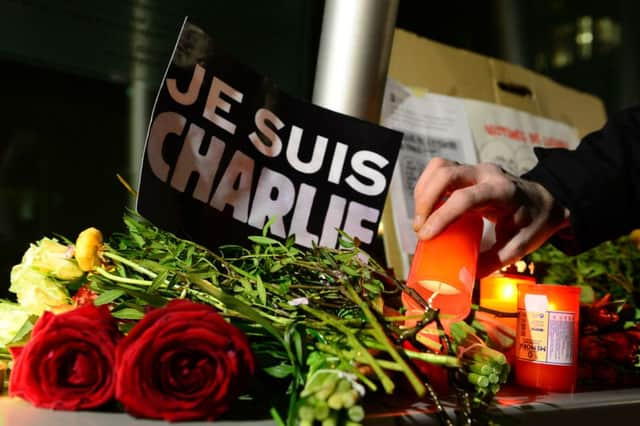Leaders: Cool head and strong will needed


The scenes that unfolded yesterday in the centre of Paris were horrific and an affront to the values we hold dear in a civilised society, be that society secular, Christian, Jewish, Hindu or Muslim.
Twelve people died when three armed men shouting “Allahu Akbar” (“God is Great”) stormed the offices of the Charlie Hebdo magazine.
Advertisement
Hide AdAdvertisement
Hide AdThis was the very definition of a hate crime. The journalists and cartoonists gunned down in cold blood at their editorial conference were murdered because their killers hated them, and were prepared to kill in the name of that hate.
It should not need to be said in such simple terms, but this act of violence was categorically and definitively wrong. It was incapable of justification on any grounds whatsoever, including whatever warped interpretation of Islamic theology the killers may have had in their minds when they set out on their gruesome spree yesterday morning.
The temptation now is to allow the horror of this crime to up the stakes in that debate about tolerance, freedom of speech and religious belief. There is an understandable desire in times like this to use such an atrocity to weight the scales on which we consider the competing arguments.
Hard though it might be, we should avoid this. We should not allow three men with guns and murderous intent to disrupt the delicate balancing act required of a society made up of many different cultures, faiths and belief systems.
The terms of that debate should be set by people of goodwill, not by savages.
Freedom of speech is one of the cornerstone rights of individuals in our society and it must be defended, but men with machine guns can play no part in affecting our values or the balancing of rights. There is nothing to be gained by allowing this atrocity to become the touchstone for our response to these complex moral challenges. In fact, there is much to be lost.
The psychology of terrorism should be familiar enough to us now. Part of its purpose is to provoke a disproportionate response – to meet extremism with extremism, and foster yet more extremism. The terrorist’s aim is to intensify the spiral of recrimination, and so perpetuate it.
And so, in the fight against terrorism there is always one weapon we have that can deprive the terrorists of one of their key objectives.
Advertisement
Hide AdAdvertisement
Hide AdThat weapon is a cool head and firm resolve. The freedoms we celebrate demand no less.
Safe, stable secure units for children
THE story in our news pages today about children in secure accommodation having to be moved to England because of a shortage of beds in Scotland is not, at root, a question of borders or nationality.
Instead it is a question of proximity, and of comfort zones.
Make no mistake, every child in secure accommodation is a vulnerable child. Whatever the circumstances that brought them to this point in their lives – and the routes can be many and varied – what these young people require is stability.
In most cases this is best served by having these young people accommodated close to their home communities and their friends and family – although there may obviously be exceptions where the authorities see the need to remove someone entirely from specific local dangers to their wellbeing.
The aim should be to make the young person feel safe and secure, both physically and emotionally. This is especially important as a stay in the unit can last a number of months.
Experts in this field, such as the charity Children 1st, say the use of accommodation sometimes hundreds of miles from a young person’s home could make the “frightening and stressful” experience of going into a secure unit even more difficult.
The issue here is not, as we say, one of borders. That would be facile. The same problems with dislocation would apply if a young person from Ayrshire was found a bed in a unit in Aberdeenshire.
Advertisement
Hide AdAdvertisement
Hide AdThe issue is ensuring that the young people for whom a secure unit is necessary – in order to protect them or to protect others – can be encouraged into the right frame of mind for the next step in their lives.